
The fraternal embrace between two Popes, Pope Francis on the left and Pope Emeritus Benedict XVI on the right.
Former Prefect of the Congregation for the doctrine of the Faith, German Cardinal Gerhard Müller, has written an essay in which he defends the participation of Pope emeritus Benedict in the current debate over priestly celibacy and rejects attempts to set him up as an opponent of Pope Francis. “The assertion that Benedict is the secret adversary of the incumbent Pope and that his plea for the sacramental priesthood and celibacy comes from an obstructionist policy directed against the expected post-synodal amazon letter can only flourish in a hotbed of theological ignorance,” he states.
By Gerhard Cardinal Müller
The deliberate media confusion regarding Benedict XVI’s co-authorship of Cardinal Sarah’s book From the Depth of Our Hearts (January 2020) simply indicates the rampant paranoia in the public sphere ever since the supposed coexistence of two Popes. For in the Catholic Church there can be only one Pope. For it is true: “The Roman Pontiff, as the successor of Peter, is the perpetual and visible principle and foundation of unity of both the bishops and of the faithful” (Vatican II, Lumen Gentium 23).
In Benedict’s contribution on the Catholic priesthood, this serious distortion of the perception of two contrary principles of unity has once again found confirmation and nourishment. On the other hand, it is openly evident that Pope Francis and his predecessor Benedict XVI are not the authors of this pathological polarization, but the victims of an ideological projection.
This threatens the unity of the Church as much as it undermines the primacy of the Roman Church. All these events only show that the mental trauma, which the renunciation of office by Pope Benedict at the beginning of 2013 has caused in the “discernment in matters of faith of the people of God” (Lumen Gentium 12; 35), is not yet healed. But the faithful have the right to a theologically clear assessment of the coexistence of a reigning Pope and his emeritus predecessor. This singular event, that the Pope as head of the college of bishops and of the visible Church, whose invisible head is Christ, leaves the cathedra of Peter, which is entrusted to him for life, before his death, can never ever be grasped by worldly categories (age-related right to retirement, desire of the people to replace their leaders). Even if canon law provides for this abstract possibility (can. 332 §2 CIC), detailed provisions and concrete experiences are still lacking as to how its status can be described and, above all, how it can be shaped in practice for the good of the Church.
In politics, there are opponents in the struggle for power. When the competitor is eliminated, the caravan moves on. But among the followers of Christ, this should not be the case. For in the Church of God all are brothers. God alone is our father. And his Son Jesus Christ, the Word made flesh (John 1:14-18), is the only teacher of all his disciples (Matthew 23:10).
Bishops and priests, through their sacramental ordination, are the servants of the Church, appointed in the Holy Spirit (Acts 20:28), who lead the Church of God in the name and authority of Christ. He speaks through their mouths as a divine teacher in sermons (1 Thessalonians 2:13). Through them, he sanctifies the faithful in the sacraments. And Christ, the “shepherd and guardian of your souls” (1 Peter 2:25) cares for the salvation of the people by appointing priests (bishops and presbyters) in His Church as their pastors (1 Pt 5:2-3; Acts 20:28). The Roman Bishop exercises the ministry of Saint Peter, who was called by Jesus, the Lord of the Church, to the universal pastoral ministry (John 21:15-17). But the bishops are also brothers among themselves. This is without prejudice to the fact that they are united as members of the college of bishops—with and under the authority of the Pope (Vatican II, Lumen Gentium 23).
A former Pope who is still alive is fraternally connected to all bishops and is under the magisterial and jurisdictional authority of the ruling Pope. But this does not in any way prohibit his word from continuing to carry great weight in the Church, because of his theological and spiritual competence as well as his episcopal and papal experience of government.
The relationship of every bishop emeritus to his successor must be marked by the spirit of fraternity. Worldly thoughts of prestige and political power games are poison in the body of the Church, which is the body of Christ. This applies a fortiori to the even more delicate relationship of the reigning Pope to his predecessor, who had renounced the exercise of the Petrine ministry and thus all the prerogatives of the papal primacy and therefore is definitely no longer the Pope.
Astonishing here is the closing of ranks of the previous enemies of the Church from the sphere of the old liberal and Marxist neo-atheism with the secularism within the Church, which wants to transform the Church of God into a humanitarian organization acting in a planetary way.
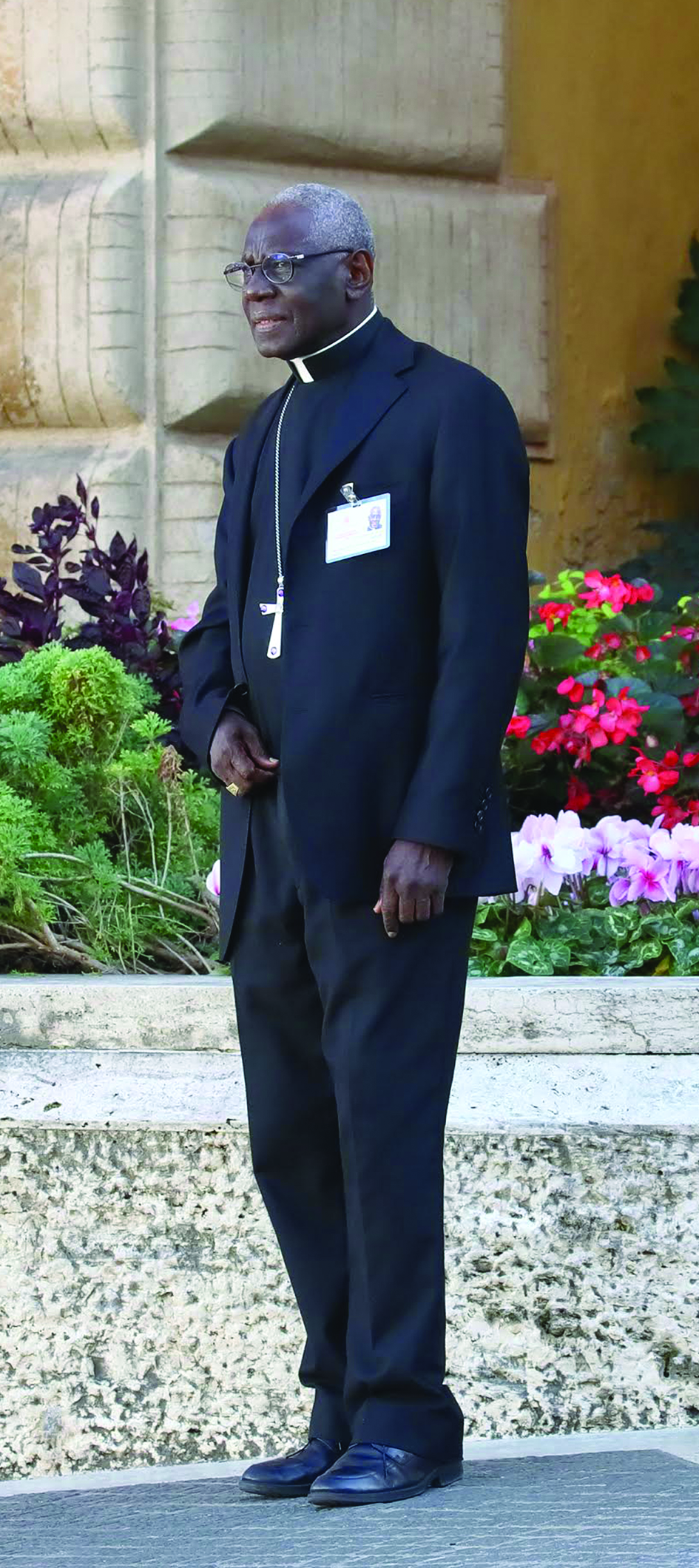
Cardinal Robert Sarah, author of the book with Benedict’s collaboration
The old enemy of the Church, Eugenio Scalfari, boasts of his new friendship with Pope Francis. United in the common idea of a man-made One-World-Religion (without Trinity and Incarnation) he offers him his collaboration. The idea of a popular front of believers and non-believers is launched against the enemies and opponents identified by him from among the cardinals and bishops, as well as the “right-wing conservative” Catholics. In it, he finds like-minded people from the group of the “Bergoglian Guard,” which presents itself in this way. This network of left-wing populists, driven by a sheer will to power, ideologically perverts the potestas plena of the Pope to a potestas illimitata et absoluta.
This is what pure voluntarism is all about: According to their conception, everything is good and true because the Pope wants it. The Pope does not, on the contrary, do and say something, because it is good and true. They contradict Vatican II, which sees the magisterium at the service of revelation, by “teaching only what has been handed on, listening to the Word of God devoutly, guarding it scrupulously and explaining it faithfully in accord with a divine commission and with the help of the Holy Spirit[…]” (Dei Verbum 10).
In this way, they expose themselves as the demonic opponents of the papacy, as it was dogmatically defined by the teachings of Vatican I and II. If already between Jesus and the disciples there is not the principle of servility but the measure of friendship (John 15:15), how should the relationship of the Pope to his brothers in the episcopate be marked by submissive opportunism and blind, irrational obedience beyond the unity of faith and reason typical of Catholic theology?
According to liberal Marxist ideas, a “seasonable” Pope legitimizes himself by ruthlessly pursuing the extreme left-wing agenda and promoting a unity of thought without transcendence, without God and the historical mediation of salvation through Christ, the only mediator between God and man (1 Timothy 2:5).
In the world (civitas terrena), rulers, opinion leaders, and ideologues do indeed abuse their power by disregarding natural moral law and divine commandments.
They often usurp the place of God and mutate into devils in human form.
But where God is recognized as the only Lord, there grace and life, freedom and love reign.
In the kingdom of God, the word of Jesus is considered a precept: “But it shall not be so among you; but whoever would be great among you must be your servant, and whoever would be first among you must be slave of all. For the Son of man also came not to be served but to serve, and to give his life as a ransom for many” (Mark 10:43-45).
Sacramental ordination (of bishop, presbyter, deacon) remains valid and effective, and with it the responsibility for the Church’s teaching and pastoral mission.
The old opponents of Joseph Ratzinger (as Cardinal Prefect and Pope) have no right to impose the damnatio memoriae on him, especially since most of them differ from his qualities as a doctor of the Church only by their shocking dilettantism in theological and philosophical questions.
His contribution to Cardinal Sarah’s book can only be discredited as a standpoint opposite to Pope Francis by those who confuse the Church of God with an ideological-political organization. They do not want to understand that the mysteries of faith can only be grasped with the “Spirit of God” and not with the “spirit of the world.” “The unspiritual man does not understand the gifts of the Spirit of God” (1 Corinthians 2:14).
When even the apostles were initially unwilling to understand that there are people who voluntarily renounce the conjugal union for the service of the kingdom of God, Jesus himself said to them, “He who is able to receive this, let him receive it” (Matthew 19:12).
And he explains it in this way: “There is no man who has left house or wife or brothers or parents or children, for the sake of the kingdom of God, who will not receive manifold more in this time, and in the age to come eternal life” (Luke 18:29-30; cf. Matthew 19:29).
The assertion that Benedict is the secret adversary of the incumbent Pope and that his plea for the sacramental priesthood and celibacy comes from an obstructionist policy directed against the expected post-synodal Amazon letter can only flourish in a hotbed of theological ignorance.
No one refutes this obsession as brilliantly as Pope Francis himself.
In the foreword to the collection of texts on the sacrament of orders on the occasion of Joseph Ratzinger’s 65th priestly anniversary in 2016, Pope Francis writes: “Every time I read the works of Joseph Ratzinger/Benedict XVI, I realize that he did and still does theology ‘on his knees’: on his knees, because one sees that he is not only an outstanding theologian and teacher of faith, but a man who really believes, really prays. You see that he is a man who embodies holiness, a man of peace, a man of God.”
And after Pope Francis has rejected the caricature of the Catholic priest as a routine functionary of an NGO Church, he once again underlines Joseph Ratzinger’s exceptional position as a theologian on the cathedra of Peter with the words: “Asso decisively affirmed by Cardinal Gerhard Ludwig Müller, the theological work of Joseph Ratzinger, and later of Benedict XVI, places him among the great theologians on the Chair of St. Peter, like Leo the Great, holy Pope and Doctor of the Church […]
“From this point of view, I would like to add to the right consideration of the Prefect of the Congregation for the Doctrine of the Faith that perhaps today, as Pope emeritus, he gives us in a particularly clear way one of his greatest lessons of ‘theology on your knees.’”
Benedict’s contribution to the Sarah book offers, in a deepened Christological-pneumatological hermeneutic of the inner unity of the Old and New Testaments, founded in God’s historical communication of self, help to overcome the theological and spiritual crisis of the priesthood, which is of the greatest importance in the renewal of the Church (cf.Vatican II, Presbyterorum Ordinis 1).
The priest is not the functionary of a company that provides religious-social services. Nor is he the exponent of an autonomous community that claims rights vis-à-vis, God, instead of receiving “every good endowment and every perfect gift from above, coming down from the Father of lights” (James 1:17).
Through Holy Orders, he is rather conformed to Jesus Christ, the High Priest, and Mediator of the New Covenant, the Divine Teacher, and Good Shepherd, who gives his life for the sheep of God’s flock (Lumen Gentium 29; Presbyterorum Ordinis 2).
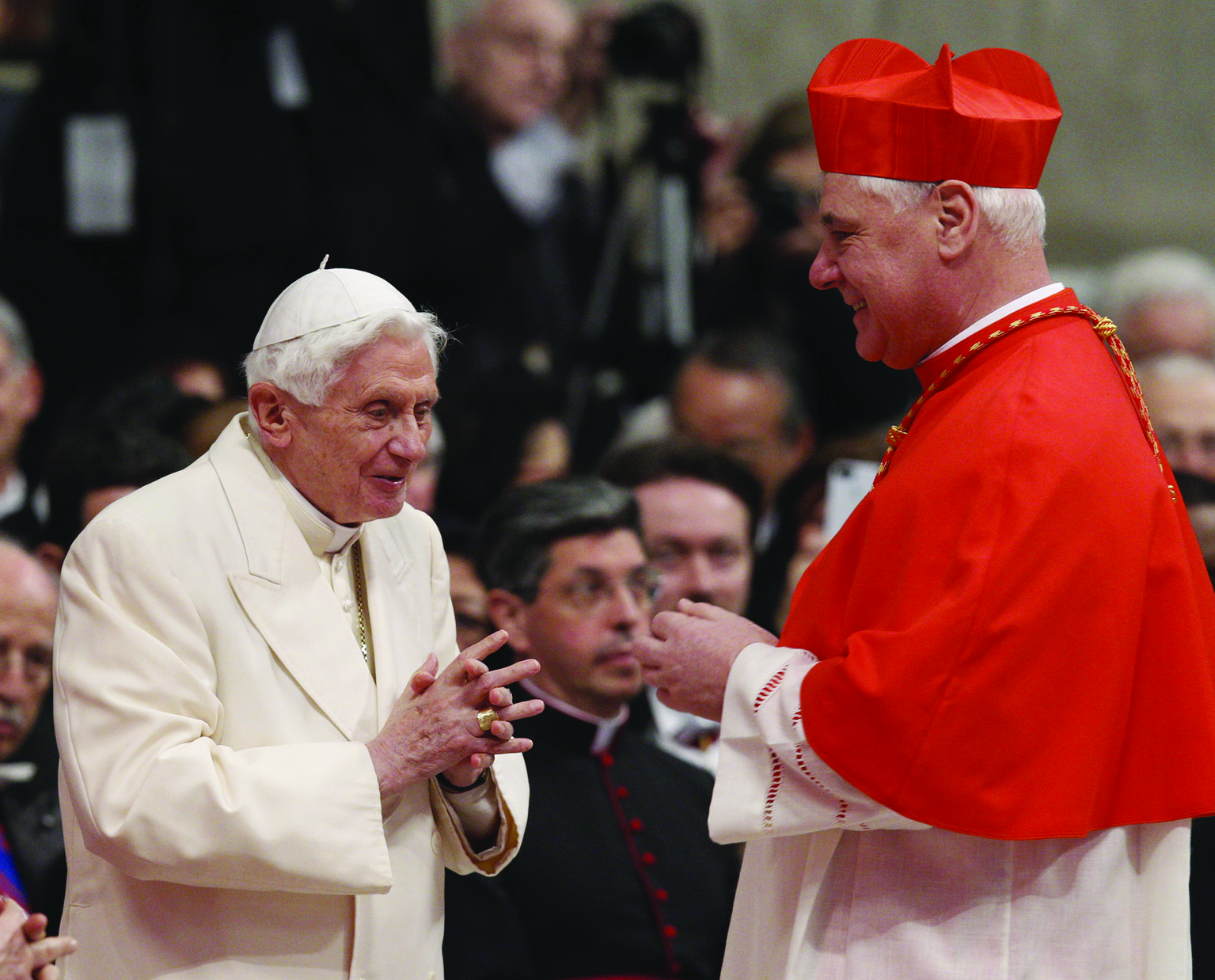 From this conformitas cum Christo also arises the inner adequacy of Christ’s celibate form of life for the sacramental priesthood. Jesus himself spoke of the disciples who, eschatologically as a testimony for the coming kingdom and in the service of the salvation of man, live sexually abstinent and renounce married and family life of their own free will (Matthew 19:12; 1 Corinthians 7:32).
From this conformitas cum Christo also arises the inner adequacy of Christ’s celibate form of life for the sacramental priesthood. Jesus himself spoke of the disciples who, eschatologically as a testimony for the coming kingdom and in the service of the salvation of man, live sexually abstinent and renounce married and family life of their own free will (Matthew 19:12; 1 Corinthians 7:32).
Celibacy is not absolutely required by the nature of the priesthood. But it arises in the most intimate appropriateness from the nature of this sacrament as a representation of Christ as the bridegroom of his bride, the Church, and the head of his body, the Church, in the power of his mission and his form of life of the total gift of self to God (cf. Presbyterorum Ordinis 16). That is why the dispensations from the law of celibacy, which are differently developed in the Eastern and Western Churches, are to be justified as exceptions, and not priestly celibacy as the rule.
Fundamentally, the Church has to work towards a celibate priesthood. From biblical roots, the practice had developed, by way of the law demanding married clerics to be continent, to ordain only candidates for bishop, priest, and deacon who promise a celibate life from the outset. In the Eastern Church—departing from the tradition of the early Church, and by no means in its continuation—it was allowed to priests and deacons by the Quinisext Council (691/692), which was characteristically held in the imperial palace and not in a church, to continue married life.
In the Latin Church, however, only unmarried men were later consecrated, who had previously promised to live a celibate life. In the Eastern Churches, married clerics, but not bishops, were allowed to continue the marriage—given sexual abstinence sometime before the celebration of the Divine Liturgy and the prohibition of a second marriage after the death of the spouse. This provision also applies to the Catholic clergy who had received a dispensation from the obligation of celibacy (Lumen Gentium 29).
For the sake of the greater good of unity, the Catholic Church accepts this practice in the Uniate Eastern Churches, and since Pope Pius XII, and with regard to the Anglicans since Pope Benedict XVI, grants a dispensation from the obligation of celibacy to clergy of other denominations who are married and enter into full communion with her, if ordination to the priesthood is being considered.
A plain abolition of priestly celibacy, as in the Protestant and Anglican communities in the 16th century would, therefore, be a violation of the nature of the priesthood and in defiance of the entire Catholic tradition. Who wanted to answer before God and his holy Church for the disastrous consequences for the spirituality and theology of the Catholic priesthood?
Even millions of priests since the foundation oftheChurchwould have to feel inwardly hurt if one were now to explain to them that their existential sacrifice for the Kingdom of God and the Church was based only on an outward legal discipline that had nothing whatsoever to do with the priesthood and the form of life of celibacy for the sake of the kingdom of heaven. The lack of priests (in number and quality) in the formerly Christian countries of the West is not due to a lack of vocations from God but to the lack of our life from the Gospel of Jesus Christ, the Son of God and Savior of the whole world.
There is not only a discussion about celibacy but also a bitter fight against it and thus, too, against the sacramental priesthood. In the 16th century, the Protestant reformers understood the ecclesiastical office only as a religious function in the Christian community, thus depriving it of its sacramental character.
If the ordination to the priesthood is no longer an inner conformation to Christ, the Divine Teacher, the Good Shepherd, and High Priest of the New Covenant, then the understanding of the inner connection to celibacy for the sake of the kingdom of God, founded in the Gospel, is also no longer applicable (Matthew 19:12; 1 Corinthians 7:32).
In the wake of the polemics of the Reformation and due to their immanentist view of man, the French Enlightenment philosophers saw in priestly celibacy and religious vows only a suppression of the sexual instinct, which led to neuroses and perversions—similar to the later interpretation of sexuality as a mechanical satisfaction of instincts, which in case of its “suppression” causes neuroses and perversions, according to depth psychology.
In today’s dictatorship of relativism, the emphasis on a sacramental authority from the higher divine authority is perceived as a clerical claim to power, and the celibate way of life as a public accusation against the reduction of sexuality to a selfish acquisition of pleasure.
Priestly celibacy appears as the last bastion of man’s radical transcendental reference and the hope for a world beyond and a world to come, but according to atheistic principles, it is a dangerous illusion.
The Catholic Church as an ideological alternative to radical immanentism is therefore fiercely fought by an international elite of power and money, who strive for an absolute rule over spirit and body of the dull masses. In a therapeutic gesture, one mimes the philanthropist who only does poor priests and religious a favor by freeing them from the shackles of their suppressed sexuality.
But in their smug intolerance, these benefactors of mankind do not notice at all how they violate the human dignity of all those Christians who take the indissolubility of marriage in their conscience before God seriously or faithfully fulfills the promise of celibacy with the help of grace.
For just there, where faithful Christians make their life decision in the innermost depth of their conscience before God, the deniers of man’s supernatural vocation want to persuade them that they have to fit into the limited horizon of an existence condemned to death as if the living God did not exist (Vatican II, Gaudium et Spes 21). “Ever since the creation of the world his invisible nature, namely, his eternal power and deity, has been clearly perceived in the things that have been made. So they are without excuse; for although they knew God, they did not honor him as God or give thanks to him. […] Claiming to be wise, they became fools and exchanged the glory of the immortal God for images resembling mortal man or birds or animals or reptiles” (Romans 1:20-23).
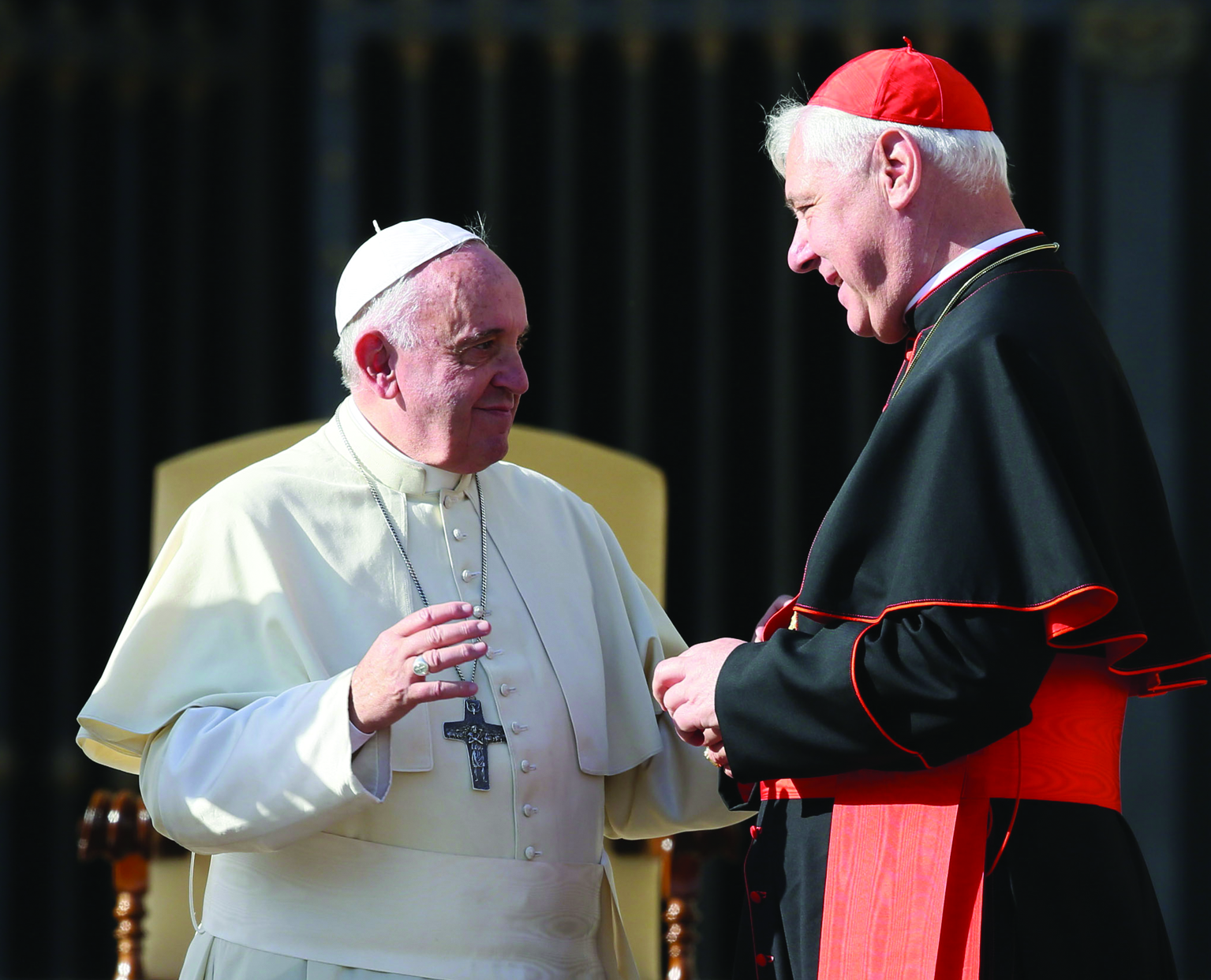 The infamous accusation is that sinister Church reactionaries with their defense of the sacramental priesthood and — in their eyes — unworldly sexual morals and misanthropic celibacy delay or even prevent the necessary modernization of the Catholic Church and its adaptation to the modern world. What they tolerate at best is a Church without God, without the cross of Christ and without the hope of eternal life.
The infamous accusation is that sinister Church reactionaries with their defense of the sacramental priesthood and — in their eyes — unworldly sexual morals and misanthropic celibacy delay or even prevent the necessary modernization of the Catholic Church and its adaptation to the modern world. What they tolerate at best is a Church without God, without the cross of Christ and without the hope of eternal life.
This “Church of dogmatic indifferentism and moral relativism,” which could also include atheists and non-believers, may speak in a seasonable way of the climate, of overpopulation, of migrants. But she must remain silent on abortion and self-mutilation draped as gender reassignment, on euthanasia, and on the reprehensibility of sexual intercourse outside of marriage between man and woman.
In any case, she would have to accept the sexual revolution as a liberation from the hostility towards the body of Catholic sexual morals. It would thus be a sign of repentance for the traditional hostility towards the body from the Manichean heritage of Saint Augustine. Despite all these flatteries, faithful Catholics are of the well-founded opinion that in the place of the atheist Scalfari, who neither believes in God nor can understand the “mystery of the holy Church” (Lumen Gentium 5), Benedict (Joseph Ratzinger) would be the infinitely more competent adviser of the Vicar of Christ, the successor of Peter and shepherd of the universal Church.
This refers both to his theological qualities and spiritual insights into the mystery of God’s love, and to the experience of a Pope’s responsibility for the universal Church, alone before God, which Benedict is the only person in this world to share with Pope Francis.
What Pope Francis writes in the preface to his predecessor’s book on the priesthood should be read by all the “wise and powerful men of this world” (cf. 1 Corinthians 2:6) before they trumpet out into the world their paranoid fantasies of papal antagonists, opposing cardinals, and impending schisms: “Joseph Ratzinger/Benedict XVI embodies that constant relationship with the Lord Jesus, without which nothing is true anymore, everything becomes routine, the priests are almost reduced to recipients of a salary, the bishops to bureaucrats, and the Church is not the Church of Christ, but something we have created, an NGO that is ultimately superfluous.”
And he continues by addressing the cardinals, bishops and priests gathered in the Sala Clementina for the book presentation on June 28, 2016, not as subordinates but as friends: “Dear Brothers! I take the liberty of saying that if any of you should ever have had any doubts about what the focus of your ministry is, its purpose, its benefit; if you should ever have had any doubts about what people really expect from us, then let him reflect on the lines presented here. That which is described and testified in this book, that we bring them Christ and lead them to Him, to the fresh and living water for which they thirst more than for anything else, that only He can give and which can be replaced by nothing; that we lead them to true and perfect happiness when nothing can satisfy them; that we lead them to the fulfillment of their secret dream, which no power in the world can promise to make come true!”
(Translation from German by Martin Bürger for LifeSiteNews)
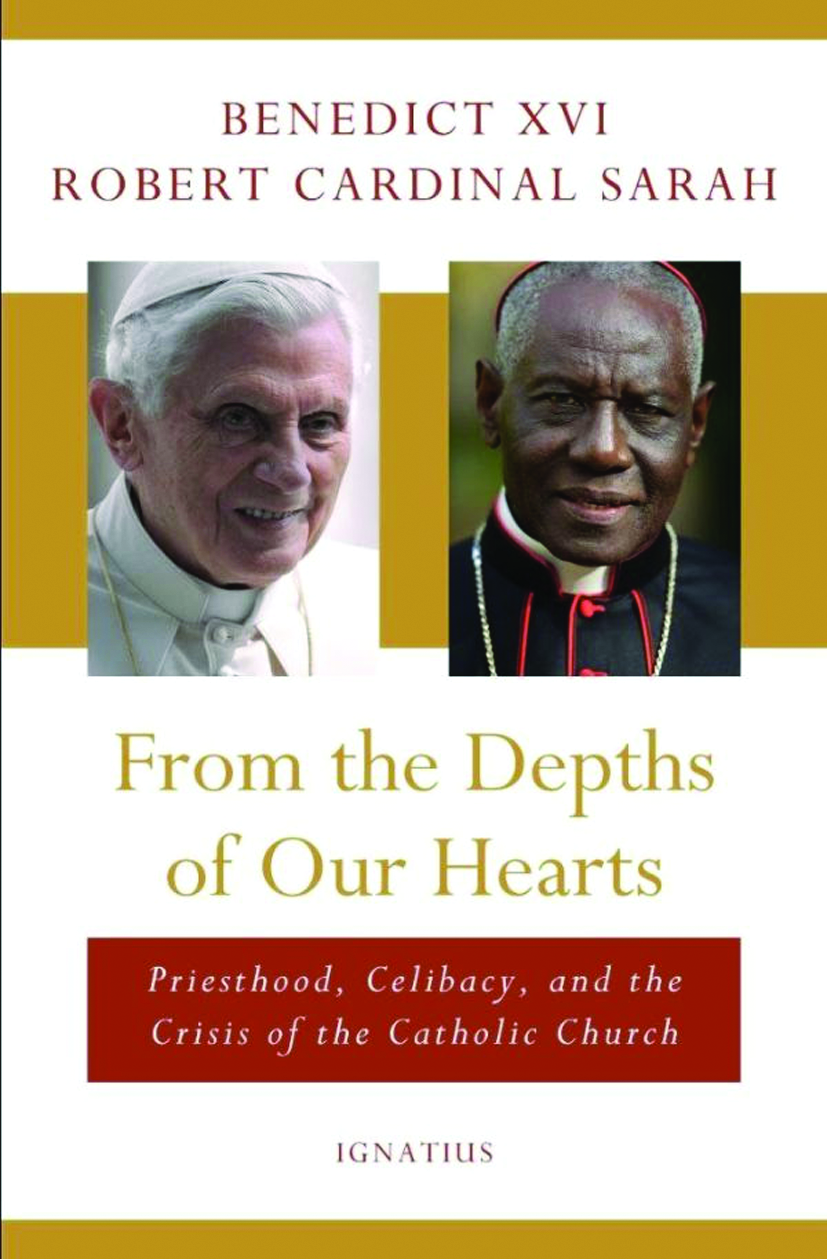 “Serving The Lord Requires The Total Gift” — From the Depths of Our Hearts (Excerpts)
“Serving The Lord Requires The Total Gift” — From the Depths of Our Hearts (Excerpts)
“The priesthood of Jesus Christ causes us to enter into a life that consists of becoming one with Him and renouncing all that belongs only to us,” Emeritus Pope Benedict XVI writes. “This is the foundation of the necessity of celibacy… and the renunciation of material goods.”
Marriage, he writes, requires man to give himself totally to his family.“Since serving the Lord likewise requires the total gift of a man, it does not seem possible to carry on the two vocations simultaneously.”
The jointly written introduction and conclusion of the book makes the case even more strongly. Dedicating the book to priests of the world, the two authors urge them to persevere and ask all the faithful to hold firm and support them in their celibate ministry.
“It is urgent and necessary for everyone— bishops, priests and laypeople—to stop letting themselves be intimidated by the wrongheaded pleas, the theatrical productions, the diabolical lies and the fashionable errors that try to put down priestly celibacy,” they write.
Pope Emeritus Benedict XVI:
“From the daily celebration of the Eucharist, which implies a permanent state of service to God, there spontaneously arose the impossibility of a marital bond for the priest. We can say that the sexual abstinence that was functional was transformed of itself into an ontological abstinence.”
“Nowadays, it is too easily asserted that [the tradition of priestly celibacy] would only be the consequence of a contempt for corporeality and sexuality….Such a judgment is wrong.”
“Without the renunciation of material goods, there can be no priesthood. The call to follow Jesus is not possible without this sign of freedom and of renouncing all compromises. I believe celibacy has great significance as an abandonment of having an earthly domain and one’s own circle of family life; celibacy even becomes really essential so that our approach towards God can remain the foundation of our life and express itself concretely.”
Cardinal Robert Sarah:
“Priestly celibacy rightly understood is a liberation, although at times it is a trial. It allows the priest to establish himself in all coherence in his identity as spouse of the Church.”
“I cannot in conscience, as a son of Africa, support the idea that the peoples being evangelized should be deprived of this encounter with a fully-lived priesthood. The peoples of the Amazon have the right to a full experience of Christ the Bridegroom. We cannot offer them ‘second class’ priests. On the contrary, the younger a church is, the more it needs to meet with the radicalism of the Gospel.”
“The ordination of married men who were permanent deacons before is not an exception, but a gap, a wound in the consistency of the priesthood. To speak of [an] exception would be an abuse of language or a lie.”
“It is urgent and necessary, that all—bishops, priests and laity—no longer allow themselves to be impressed by the bad arguments, staged theater, diabolical lies, and fashionable errors that want to devalue priestly celibacy.”
“It is urgent and necessary, that all, bishops, priests and laity, rediscover a perspective of faith on the Church and on priestly celibacy which protects her mystery.”
“This perspective will be the best bulwark against the spirit of division and politics but also against the spirit of indifference and relativism.”
“The possibility of ordaining married men would represent a pastoral catastrophe, an ecclesiological confusion and an obscuring of the understanding of the priesthood.”

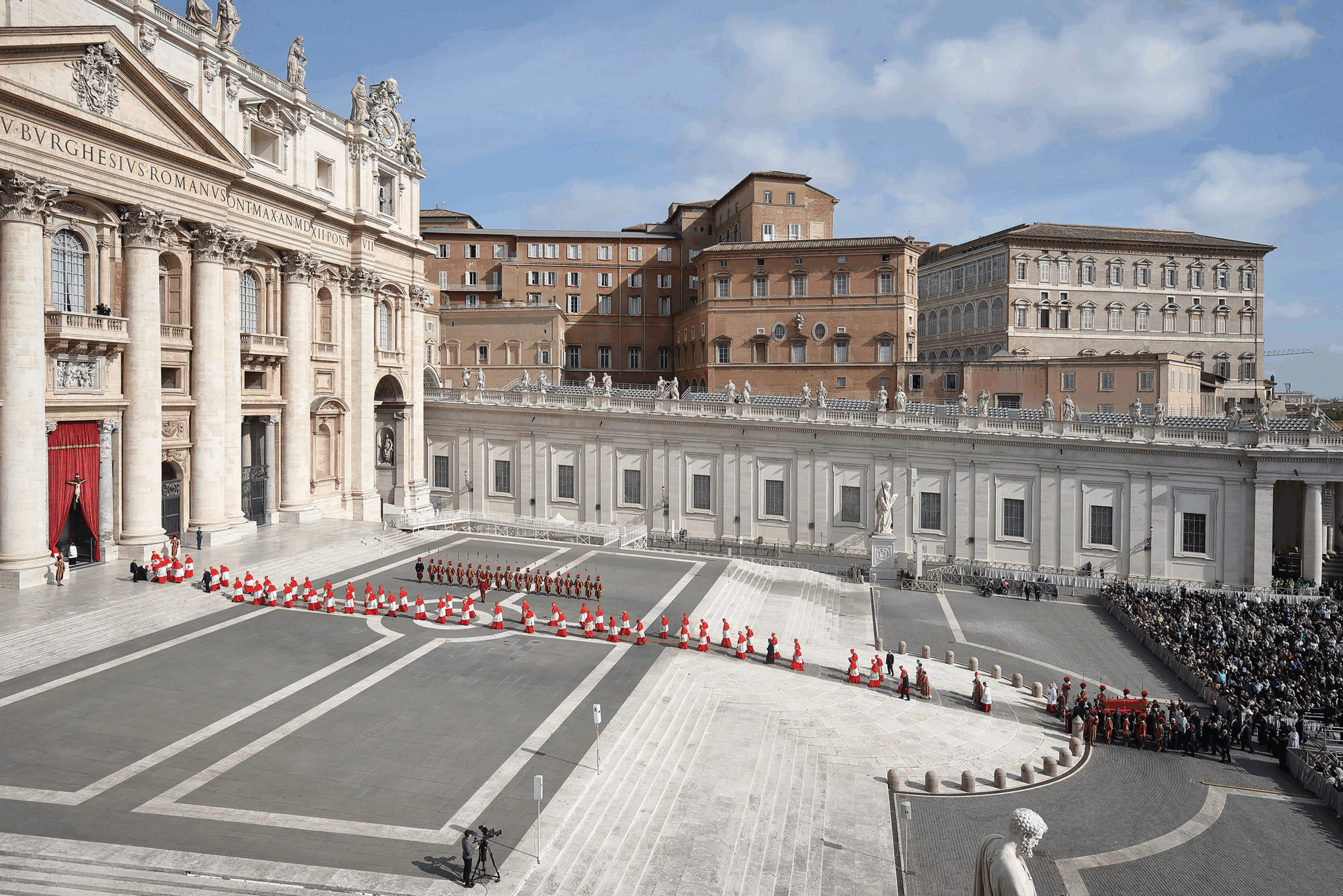




Facebook Comments